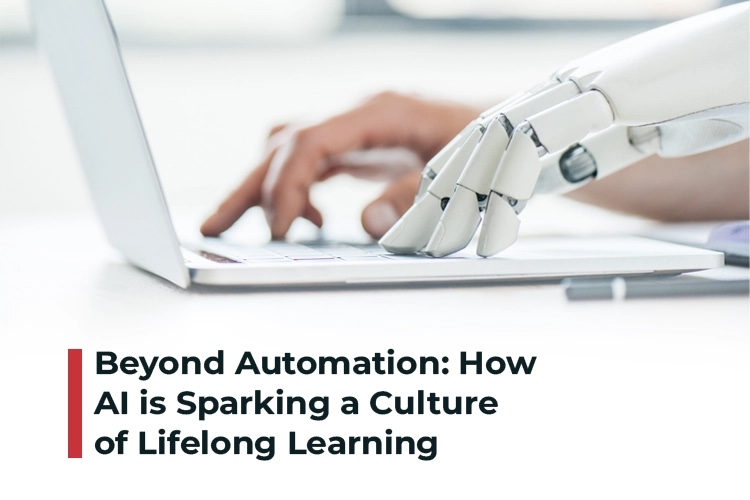
Beyond Automation: How AI is Sparking a Culture of Lifelong Learning
Artificial Intelligence (AI) is revolutionizing our world, extending far beyond mere automation. It is reshaping how we learn and adapt in today’s fast-paced environment. “AI is not just automating tasks; it’s transforming how we acquire knowledge and skills.”
Lifelong learning emerges as a crucial concept in this era of rapid technological advancement. It emphasizes the continuous pursuit of knowledge, skills, and competencies, enabling individuals to thrive in an ever-changing landscape.
AI plays a pivotal role in nurturing this culture of continuous education by providing personalized, accessible, and collaborative learning experiences. As we delve deeper into the ways AI fosters lifelong learning, we uncover a future where education is more dynamic and inclusive than ever before.

AI-Powered Personalized Learning
AI is reshaping the educational landscape by creating personalized learning experiences tailored to individual needs. By leveraging adaptive learning technologies, AI adjusts educational content in real time, aligning with each learner’s pace and understanding. This personalization ensures that students receive targeted instruction, enhancing their learning outcomes.
Adaptive Learning Technologies
Platforms like SC Training, Adaptemy, and Knewton exemplify the power of AI in adapting educational content. These tools provide data-driven insights and personalized learning paths, ensuring that each student receives the support they need.
Popular AI Tools in Education
- Carnegie Learning: Offers interactive math lessons with real-time feedback.
- Duolingo: Provides personalized language learning experiences.
- TutorMe: Connects learners with certified tutors using AI.
- Smart Sparrow: Facilitates self-paced learning with adaptive feedback.
These AI tools not only enhance learning personalization but also foster a culture of lifelong learning, encouraging students to continuously refine their skills and knowledge.
Enhancing Accessibility in Education
Artificial Intelligence (AI) is revolutionizing how education is delivered, breaking down barriers for diverse learners. By providing personalized learning experiences, AI caters to students’ unique needs, including those with disabilities. It offers multilingual support and social-emotional learning tools, ensuring education is accessible to all.
Artificial Intelligence (AI) is revolutionizing how education is delivered, breaking down barriers for diverse learners. By providing personalized learning experiences, AI caters to students’ unique needs, including those with disabilities. It offers multilingual support and social-emotional learning tools, ensuring education is accessible to all.
Traditional Accessibility | AI-Enhanced Accessibility |
Limited adaptive resources | Personalized, adaptive learning platforms |
Language barriers | Real-time translations and multilingual support |
Physicalandcognitive limitations | Speech recognition and text-to-speech technologies |
“AI is not just a tool for learning; it is a bridge to accessibility for all student”
Tools such as speech recognition and text-to-speech converters are pivotal in eliminating learning barriers, allowing seamless engagement in educational activities. Such technologies are making strides in inclusive education, ensuring that all students have equitable access to learning opportunities.
AI and Collaborative Learning
Artificial Intelligence (AI) is fundamentally transforming collaborative learning by enhancing interaction and personalizing experiences. AI-powered platforms enable seamless communication among students, facilitating effective idea exchange regardless of their location. This personalizes group learning experiences, catering to diverse learning styles and ensuring that all group members’ needs are met, resulting in an inclusive environment.
“Collaboration is the cornerstone of innovation, and AI is the tool that shapes this foundation.”
In virtual classrooms, AI-driven communication tools like Nearpod and Pear Deck integrate interactive elements and real-time feedback, promoting student engagement. These tools analyze student responses, enabling educators to tailor content delivery to each learner’s pace and understanding.
Platforms Enhancing Collaboration
360Learning and Docebo are prime examples of platforms utilizing AI to foster collaborative learning. They empower learners and educators by offering tools for content creation, personalized learning paths, and real-time performance insights, making learning both dynamic and interactive.
Skill Development and AI
Artificial Intelligence (AI) is a game-changer in skill development and reskilling, empowering employees to meet the demands of a rapidly evolving job market. By leveraging AI tools, companies can enhance learning experiences and close skill gaps, ensuring their workforce remains competitive.
- Upskilling vs. Reskilling: AI facilitates both by enhancing existing skills and teaching new ones.
- AI Tools: Computer vision, machine learning, and natural language processing are pivotal in upskilling initiatives.
- On-the-Job Training: Employees gain practical experience with AI tools in their daily tasks.
AI-driven education not only prepares individuals for future job roles but also encourages continuous learning, essential for adapting to the changing job landscape.
FAQs on AI in Education:
Q1: “What are the dangers of AI in education?”
A1: AI can sometimes provide outdated information and may perpetuate biases present in its training data. This can lead to the amplification of harmful stereotypes. To address this, some organizations are developing walled-garden AI trained on vetted content.
Q2: How can educators incorporate AI in the classroom?
A2: Educators should first familiarize themselves with AI technologies. AI can help in creating lesson plans and providing feedback. It’s recommended to allow students to use AI for assignments while requiring documentation of its use, fostering a partnership rather than dependency.
Q3:What benefits does AI bring to education?
A3: AI offers personalized learning experiences by adapting content to individual needs. For instance, AI-driven platforms can tailor educational resources based on a student’s learning style. Moreover, AI enhances communication and can serve as virtual tutors, supporting students outside of classroom hours.
Conclusion and Future Outlook
AI is undeniably reshaping education by fostering personalized learning, enhancing accessibility, and addressing skill gaps. As we look to the future, AI is expected to revolutionize lifelong learning, making education more adaptive and inclusive. This transformation will not only support diverse learning needs but also prepare individuals for an ever-evolving job market.
“The future of AI in education promises a world where learning is accessible to all, anytime and anywhere,” empowering learners to continuously develop new skills.
As we embrace these AI-driven opportunities, it’s crucial to remain mindful of potential challenges, ensuring equitable access and maintaining educational integrity. Dive into this new era with curiosity and readiness to adapt, leveraging AI as a powerful ally in lifelong learning.

infinigent consulting Ltd
infinigent Consulting Ltd. is a multinational strategic management consulting firm operating in India, Canada, and Bangladesh, with plans to expand to Singapore and Dubai. Our diverse team of international and local experts delivers tailored solutions to address business challenges. By closely collaborating with clients, we focus on improving organizational performance through customized, effective strategies.